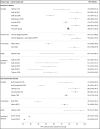Identifying Parkinson's disease and parkinsonism cases using routinely collected healthcare data: A systematic review
- PMID: 30703084
- PMCID: PMC6354966
- DOI: 10.1371/journal.pone.0198736
Identifying Parkinson's disease and parkinsonism cases using routinely collected healthcare data: A systematic review
Abstract
Background: Population-based, prospective studies can provide important insights into Parkinson's disease (PD) and other parkinsonian disorders. Participant follow-up in such studies is often achieved through linkage to routinely collected healthcare datasets. We systematically reviewed the published literature on the accuracy of these datasets for this purpose.
Methods: We searched four electronic databases for published studies that compared PD and parkinsonism cases identified using routinely collected data to a reference standard. We extracted study characteristics and two accuracy measures: positive predictive value (PPV) and/or sensitivity.
Results: We identified 18 articles, resulting in 27 measures of PPV and 14 of sensitivity. For PD, PPV ranged from 56-90% in hospital datasets, 53-87% in prescription datasets, 81-90% in primary care datasets and was 67% in mortality datasets. Combining diagnostic and medication codes increased PPV. For parkinsonism, PPV ranged from 36-88% in hospital datasets, 40-74% in prescription datasets, and was 94% in mortality datasets. Sensitivity ranged from 15-73% in single datasets for PD and 43-63% in single datasets for parkinsonism.
Conclusions: In many settings, routinely collected datasets generate good PPVs and reasonable sensitivities for identifying PD and parkinsonism cases. However, given the wide range of identified accuracy estimates, we recommend cohorts conduct their own context-specific validation studies if existing evidence is lacking. Further research is warranted to investigate primary care and medication datasets, and to develop algorithms that balance a high PPV with acceptable sensitivity.
Conflict of interest statement
The authors have declared that no competing interests exist.
Figures



References
Publication types
MeSH terms
Grants and funding
LinkOut - more resources
Full Text Sources
Medical

